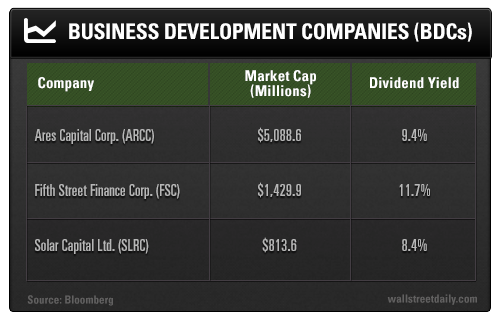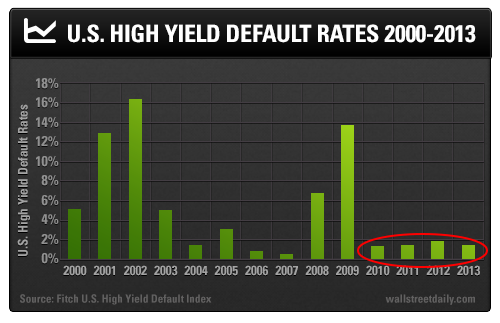If leverage is dangerous, then hidden leverage is a deadly, fire-breathing beast.
In 2008, as the financial crisis unfolded, we learned that banks were masking their true leverage ratios by utilizing off-balance-sheet structures.
Having seen the destruction that followed, we could safely assume that the sins of the past would never be repeated, right?
Wrong.
Today, with interest rates low and credit spreads tight, hidden leverage is being employed to combat declining portfolio yields.
A certain class of companies in the so-called “shadow banking system” is increasingly utilizing off-balance-sheet leverage structures… and their stocks also happen to be popular, high-yielding securities.
File this under the heading: What could possibly go wrong?
Leverage Development Companies
Business development companies (BDC) principally engage in lending to small and mid-size companies that may not be able to obtain financing from the big banks.
BDCs are basically closed-end investment funds that are publicly traded. This structure allows smaller, non-accredited investors to invest in companies in the initial stages of their development.
But here’s the problem…
Fitch Ratings has warned that several BDCs, including Ares Capital Corporation (NASDAQ:ARCC), Fifth Street Finance Corp (NASDAQ:FSC), and Solar Capital Ltd (NASDAQ:SLRC) are utilizing off-balance-sheet loan programs to take on additional leverage.

Maybe we should start calling them leverage development companies?
After all, leverage is one of the primary reasons BDCs provide such high yields in the first place. And now, BDCs are apparently utilizing structures that allow them to circumvent their regulatory leverage caps (debt/equity of 1.0x imposed by the Investment Company Act of 1940).
These leverage limits exist for a good reason – BDCs are essentially banks in that they act as financial intermediaries by borrowing and lending money.
Nonetheless, despite the risks, BDCs are popular among income investors for their fat yields. Ares Capital, Fifth Street Finance, and Solar Capital pay 9.4%, 11.7%, and 8.4%, respectively. However, as investors, it’s necessary to determine if these high yields sufficiently compensate us for the risks involved.
One of the primary risks of owning these BDCs is their exposure to a surge in the corporate default rate. The chart below gives you some indication of the credit environment we’ve been in since the financial crisis:

By historical standards, default rates have been very low, and they’ve continued to stay low in 2014. According to Moody’s, the trailing 12-month U.S. speculative-grade (high yield) default rate was 1.9%, as of June 2014. Indeed, the past few years have been a great stretch for levered credit portfolios.
However, the period just after a spike in defaults is actually the best time to own securities, like BDCs, that are acutely sensitive to the health of the credit markets.
Plus, as you know, corporate bond spreads have been diverging with equities recently, signaling potential danger. Couple this warning sign with the difficulty of assessing the risk of potential hidden leverage, and I think we should avoid BDCs.
So where can an investor look for high yields?
With respect to the fixed-income markets, it’s important to understand the distinction between the general level of interest rates (fed funds rate and government bond yields) and credit spreads (additional yield earned for lending to risky borrowers).
As I’ve said before, I believe the general level of interest rates will stay low for longer than most people expect.
Because of this view, I still feel that the mortgage REIT preferreds offer a more attractive risk-reward ratio. The mREITs also use leverage but are more sensitive to the general level of interest rates, not default rates and credit spreads.
Safe (and high-yield) investing,
